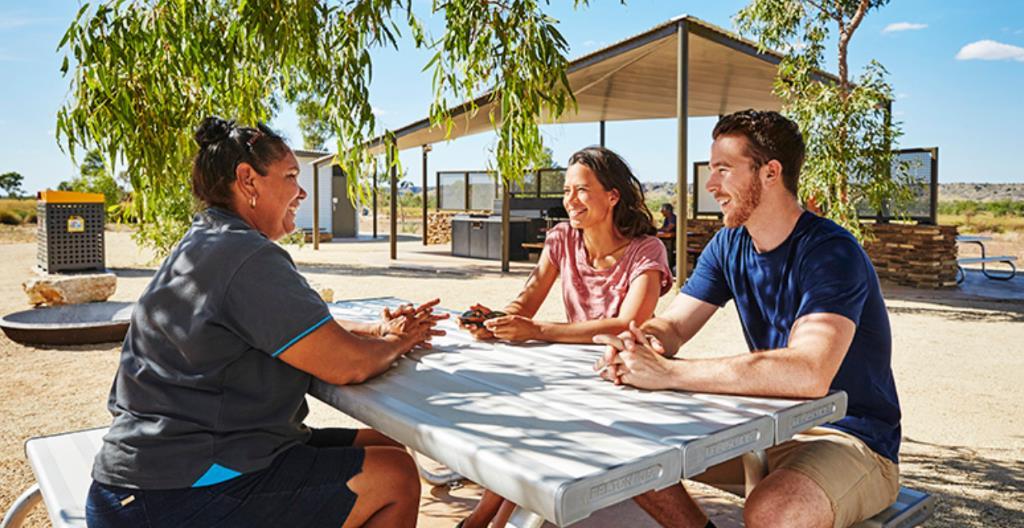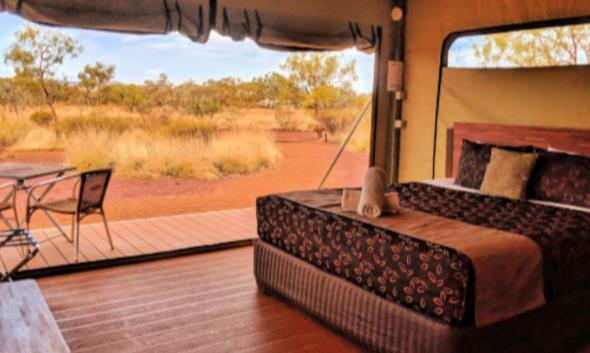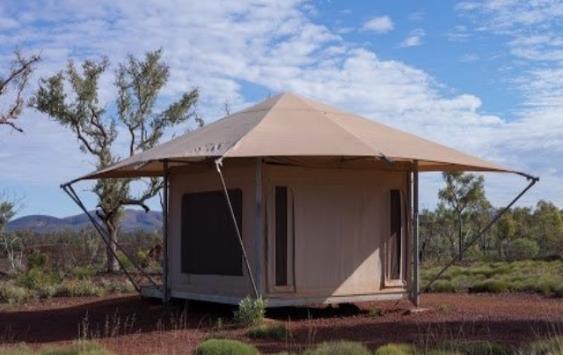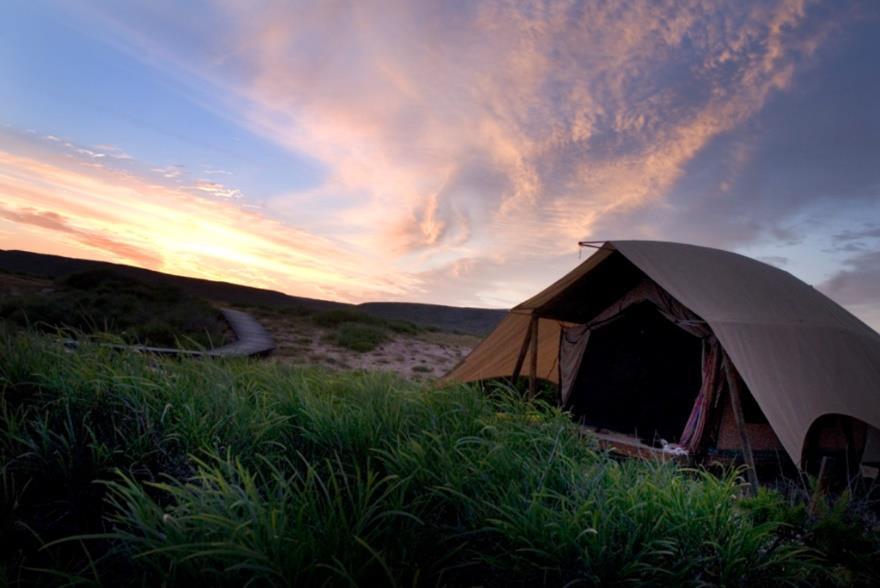
8 minute read
APPENDIX A. CASE STUDIES
Camping with Custodians
‘Camping with Custodians’ is an Australian-first initiative that involved the development of highquality campgrounds on Aboriginal lands in Western Australia open to the public and operated by the community. Commenced with an initial site in the Kimberley, a total of five campgrounds now exist in the Camping with Custodians network.
At the time of writing this strategy, the current Camping with Custodians locations are at Imintji, Jarlarloo Riwi Mimbi, Peedamulla Station, Violet Valley and Doon. None of these are located within Australia’s Golden Outback or in the southern part of Western Australia, opening an opportunity for development to potentially be extended into Esperance or its surrounds and engage ETNTAC.
Research has shown that whilst visitor interest in Aboriginal experiences is high, participation is not reflected at the same level, primarily due to lack of available experiences. Development of Camping with Custodians sites provides a way to address this. Extensive feasibility investigations, business planning and compliance requirements have been prepared for the sites currently involved in the initiative. Economic advantages for each community that might be gained from income from camping and linked business opportunities such as tours, cultural and art centres, cafes, roadhouses, equipment hire, and firewood supply have been considered. This includes an employment structure that enables variable working arrangements and family participation compatible with Aboriginal lifestyles and commitments to culture and country.
Other interested communities that have shown interest in the initiative have been provided with an action plan that addressed the range of requirements for them to achieve operational and legally compliant camping grounds over the next few years. In some instances, the actions are standard requirements for setting up a business, while in other cases the requirements involve complex land negotiations and legal access matters. The plans include suggested avenues for capacity development through securing funding for Camping with Custodians business support/mentoring. Benefits which have been achieved include examples such as employment for Aboriginal employees, expansion of original site capacities, lease agreements with tour operators, linking to visitors through events, linking to existing products and attractions and extending visitor length of stay.
Tourism WA is responsible for identifying Camping with Custodians opportunities and assisting selected communities prepare for, and deliver, their campground facilities and related activities. In addition, Tourism WA is responsible for promoting the initiative with the ultimate goal of marketing a network of campgrounds and linking them to quality experiences.
The key criteria for Tourism WA support for potential Camping with Custodians projects includes the campground being near a popular tourism route, a strongly engaged community located close by, and where a strong business case can be demonstrated.
The following general guiding principles are used to determine participation in Camping with Custodians: • Camping with Custodians involves camping on land owned or controlled by Aboriginal people. It is possible for Camping with
Custodians to be on conservation estate but in that case the Aboriginal stakeholder(s) would be required to have a leasehold or other tenure that places decision making for the camping ground in their hands; • Camping with Custodians involves a camping experience or linked activities where there is obvious interaction between Aboriginal people and campers, enabling the visitor to learn about lifestyle, history, heritage and culture of
West Australian Aboriginal people. The experience could be an immersion in life on a cattle station, a learning of remote area community living, or an appreciation of traditional and/or contemporary Aboriginal ties to land and environment;
• Camping with Custodians camping grounds need to be fully compliant with all the requirements of the State's caravan and camping regulations. The camping grounds need to strive to provide facilities and comfort at a level that makes those standards an attraction in themselves, such as flushing toilets, hot showers and potable water.
Figure 4. Camping with Custodians.
SOURCE: WWW.TOURISM.WA.GOV.AU
Karijini Eco Retreat
Karijini Eco Retreat is a unique outback glamping retreat in the heart of the spectacular Karijini National Park. Designed with the environment in mind - guests embrace a 'greener' style of accommodation which incorporates eco-friendly practices ensuring environmentally sustainable management of the natural and cultural values of one of the most ancient landscapes on earth.
Karijini Eco Retreat is owned by Gumala Enterprises Pty Ltd, the business arm of the Gumala Aboriginal Corporation, which is one of Australia’s largest 100% Traditionally Owned organisations, serving the Banjima, Yinhawangka and Nyiyaparli people of the Pilbara region.
The retreat operates within Karijini National Park in collaboration with the DBCA and the Traditional Owners to contribute to the management of the environmental, geographical and cultural values of this world class park. There is potential to follow a Karijini Eco Retreat/Gumala Aboriginal Corporation (100% Aboriginal owned) style model. This includes:
• 64 campsites
• 5 group campsites • 40 upmarket eco tents with ensuites
• 10 dorm style eco tents • dorm style cabins • Alfresco 5 Star Dining • Bar & affordable burger options for budget travellers.
Karijini Eco Retreat is accredited with Ecotourism Australia, has been recognised by TripAdvisor and is the recipient of multiple Western Australian Tourism Awards.
Figure 5. Karijini Eco Retreat



SOURCE: WWW.KARIJINIECORETREAT.COM.AU
Sal Salis Ningaloo Reef, WA
Sal Salis Ningaloo Reef is an exclusive beach safari camp nestled in the dunes of the Cape Range National Park near Exmouth in Western Australia. Each of the fifteen eco-luxe wilderness tents offers views of the surrounding bush and over the Indian Ocean and the fringing Ningaloo Reef.
Similar to Sal Salis being an accommodation base and gateway for visitors who want to experience marine-based activities at the UNESCO World Heritage listed Ningaloo Reef, Esperance could offer a luxury model facilitating visitor access to the Recherche Archipelago.
Australian-owned, Journey Beyond has a growing national footprint, and is fast positioning itself as one of the largest experiential tourism businesses in the country. Journey Beyond is focussed on bringing Australia’s unique and iconic experiences to life and also owns other tourism experiences such as The Ghan, Indian Pacific, Horizontal Falls Seaplane Adventures, Eureka Skydeck, Rottnest Express and Cruise Whitsundays (among others). Salis operates under a lease agreement with Western Australia’s Parks and Wildlife Service in what is a role model partnership between National Parks and private sector tourism and with the aim of conserving the region’s natural environment through educational and environmentally sound tourism operations. In addition to the park entrance fees, 5% of their turnover goes to Western Australia’s Department of Biodiversity, Conservation and Attractions, Parks and Wildlife Service to assist in their conservation work directly in the Cape Range National Park.
The camp was built with a minimal impact on the environment. Boardwalks also prevent unnecessary soil erosion, and all guests are reminded to keep to the designated footpaths while walking around the camp. The colour of the tents and the lodge ensures that the camp blends in naturally with the surrounding landscape.
Almost 100% of the camp’s power is generated by the sun through an array of solar panels to ensure a predominantly clean source of energy and preserve the peace and quiet of this pristine area. There is no internet connection or signal at Sal Salis, so computers and mobile phones are not a distraction to guests. Hot water is heated by gas, and the tents are not equipped with air-conditioning or hairdryers! All the tents face the ocean which allows the coastal breeze to naturally cool the interior and at the same time expose guests to the sights and sounds of the surrounding bush and ocean. Each en-suite bathroom has an effective composting toilet which is transported off-site to be cleaned and the grey water from the showers and hand basins is carefully managed to ensure only filtered water is dispensed back into the ground.
The linen is supplied by EcoDownUnder, which is organic cotton and chemical free. All laundry is transported back to Exmouth for processing. Their sheets are a sand colour and are not bleached to maintain pure whiteness. Their composition means that they can hang dry and eliminate the need for ironing.
Soaps for guests are produced locally, are chemical free and incorporate native herbs. They supply organic shampoos and conditioners for guests and urge guests to refrain from using non-eco bathroom products. Individual solar lanterns provide a safe lighting feature along the pathways to guide guests back to their tents at night.
In keeping with best practice ecosustainability, each tent is allocated 20 litres of water per person, per day. Restricting freshwater run-off not only reduces the likelihood of weed growth but protects the Ningaloo Reef, as ultimately the shower water will percolate through the soil, adding fresh water to our shoreline and to the Reef. They have a 3-minute shower time policy and recommend a swim in the ocean as the best way to freshen up in the morning.
Filtered drinking water is provided at camp and guests are encouraged to refill their personal drinking containers. As part of our commitment to the environment they are trying to find acceptable alternatives to the plastic drinking bottles and ask their guests to participate in this awareness campaign.
All the waste generated by the camp is carefully transported back to the Exmouth waste depot. Where possible chemical containers are all reused. Used bottles and cans are separated at camp and returned to the Exmouth recycle depot.
Wherever possible, they make use of products that are local to the Exmouth Region and Western Australia.
Figure 6. Sal Salis


SOURCE: WWW.SALSALIS.COM.AU





